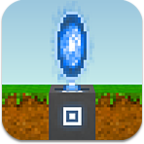Paint: Difference between revisions
>McClaw (→Using) |
>McClaw (→Using) |
||
| Line 16: | Line 16: | ||
Paint will not color the sides of a block if applied to its front or an adjacent back wall. A Blockhead using paint will not disturb a placed object such as a [[ladder]] or [[Oil Lantern|oil lantern]]. The base block of a [[portal]] placed in front of a painted back wall will adopt the painted color, and removing it will not remove the paint. Removing a front-painted block may transfer the paint to any back wall that remains. Painting ignores the presence of [[Crafting Surface|crafting surfaces]] and will apply to any back wall behind it. | Paint will not color the sides of a block if applied to its front or an adjacent back wall. A Blockhead using paint will not disturb a placed object such as a [[ladder]] or [[Oil Lantern|oil lantern]]. The base block of a [[portal]] placed in front of a painted back wall will adopt the painted color, and removing it will not remove the paint. Removing a front-painted block may transfer the paint to any back wall that remains. Painting ignores the presence of [[Crafting Surface|crafting surfaces]] and will apply to any back wall behind it. | ||
Any solid block can be painted, including [[glass]]. The basic texture (and transparency) of the painted block will tend to show through. | |||
==Removing== | ==Removing== | ||
Revision as of 21:49, 7 April 2013
- "Splash some color around."
Paint is a tool for decorating a world by changing the color of blocks and back walls.
Appearance
Paint appears in a Blockhead's inventory as a bucket overflowing with a liquid of its color. Different colors of paint are treated as different items in inventory and cannot be stacked with each other.
Creating
A mixing bench is used to create paint from a tin bucket, five oil, and one to three units of dye. The color of paint produced depends on the combination of dyes used, selected within the mixing bench menus. The level of the mixing bench limits the number of dyes allowed, see Dye for results.
Using
A single bucket of paint can be used approximately 128 times (although side walls, floors, and ceilings may count half), slowly wearing down with each application. Each application will color one space unit of block, side wall, floor, ceiling or back wall. When a bucket of paint is used up, an empty tin bucket will be returned.
Painting a ceiling, floor, or side wall surface requires accurate selection tapping, as they are typically only visible when positioned away from the center of the display. A Blockhead can paint any surface of an adjacent block, even if the bulk of the block is between the Blockhead and that surface. (In other words, a Blockhead can paint the far side of a block.)
Paint will not color the sides of a block if applied to its front or an adjacent back wall. A Blockhead using paint will not disturb a placed object such as a ladder or oil lantern. The base block of a portal placed in front of a painted back wall will adopt the painted color, and removing it will not remove the paint. Removing a front-painted block may transfer the paint to any back wall that remains. Painting ignores the presence of crafting surfaces and will apply to any back wall behind it.
Any solid block can be painted, including glass. The basic texture (and transparency) of the painted block will tend to show through.
Removing
Paint stripper functions as an anti-paint, removing one space unit of paint.
Placing most blocks in front of a painted back wall will remove the paint there which will not return if the block is removed. This applies to placing ice as well. Painted side walls, floors, ceilings, and solid blocks are unaffected by this.
It's assumed that removing a back wall (by removing the generating block above it) will remove any paint on it. A painted block that is removed and placed elsewhere will no longer be painted.
